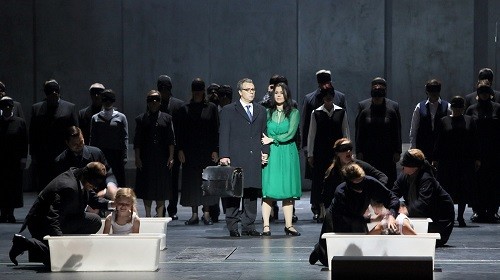 Germany Halévy: La Juive, Bayerisches Staatsorchester, Chor der Bayerischen Staatsoper, Bertrand De Billy (conductor), National Theatre, Munich, 30.6.2016 (JMI)
Germany Halévy: La Juive, Bayerisches Staatsorchester, Chor der Bayerischen Staatsoper, Bertrand De Billy (conductor), National Theatre, Munich, 30.6.2016 (JMI)

New Production:
Direction: Calixto Bieito
Sets: Rebecca Ringst
Costumes: Ingo Krügler
Lighting: Michael Bauer
Cast:
Rachel: Aleksandra Kurzak
Eléazar: Roberto Alagna
La Princesse Eudoxie: Vera-Lotte Böcker
Léopold: John Osborn
Brogni: Ain Anger
Ruggiero: Johannes Kammler
Albert: Tareq Nazmi
La Juive enjoyed great popularity during the 19th century, but it had become somewhat of a rarity by the second half of the 20th century. Some important opera houses do program it occasionally, as did Lyon this spring.
The Bayerische Staatsoper has commissioned a new production by Calixto Bieito, and it is both surprising and disappointing. This work has always been identified with French grand opera, and the stage has usually been spectacular, particularly in the crowd scenes. Calixto Bieito chose to strip the work of all its glamour and focused instead on the characters’ personal drama. One stage set is used for the opera’s five acts: a large wall that takes different forms throughout the opera. The costumes have been brought into modern times and are all dark gray, with the sole exception of the protagonist who wears a green dress. The production itself is also very dark from beginning to end.
The atmosphere of religious confrontation between Christians and Jews loses much credibility here. The action could indeed have been moved to more recent times, but this modern setting makes the plot much less believable. The stage direction was too static in the crowd scenes, and Mr. Bieito gave little direction to the actors, unlike his work in the past – regardless of the fact that his productions have been more or less scandalous.
The musical direction was entrusted to Bertrand De Billy, whose reading was acceptable throughout the opera. It was neither brilliant nor inspired conducting, but everything worked properly, and it was never boring. As usual, the orchestra was excellent, and the same can be said of the chorus.
The title character is Rachel, the adopted daughter of the Jewish goldsmith Eléazar, although the opera is more identified with the latter and his famous aria, “Rachel, quand du Seigneur.” Kristina Opolais had been announced for the part of Rachel, while Aleksandra Kurzak was cast in the role of Princess Eudoxie. Ms. Opolais’s cancellation meant that Aleksandra Kurzak sang the part of Rachel, which is, to a certain point, as if Liu were to replace Turandot.
Ms. Kurzak has always been a light-lyric soprano, and hence I was surprised to see her programmed as Rachel. I had not heard her on stage in the past five years, and I found her much more interesting than before, both as singer and as artist. Her voice is now darker and wider. Rachel is not a character who is suited to a lyric soprano, but Ms. Kurzak seemed better off in this role than as Princess Eudoxie. She was always convincing and sang the part with great intensity, though I missed a most consistent sound, especially in the low notes. Perhaps her presence had something to do with her husband, Roberto Alagna, who played Eléazar. The truth is that she did better than he did, but there were moments, especially in the last two acts, where she pushed her voice, and I wonder if the role will end up taking its toll.
The main appeal of this performance was the presence of Mr. Alagna as Eléazar, a character that requires an almost dramatic tenor. Alagna did well throughout the opera, although sometimes his voice seemed light for the role. He sang his famous aria with gusto but fell short on emotion. Perhaps he was thinking of the cabaletta he had to sing afterwards: he had all kinds of difficulties, including failed notes, and was booed, which is quite unusual in Munich. To his credit, he was the only one whose singing I could understand.
John Osborn as Prince Léopold solved the character’s unfriendly tessitura, which appears to have been written to sing in falsetto. He was a luxury in the character.
Soprano Vera-Lotte Böcker was the new Princess Eudoxie. It’s the first time I’ve heard her on stage, and she left a positive impression. Her voice is nicely suited to the character, with good agility and easy at the top of the range. The opera was done in the original French, but I confess I did not understand a single word from her. Something similar, though not at the same level, happened with Aleksandra Kurzak.
Cardinal Brogni was played by Ain Anger, one of the most important bass voices today, but he lacked flexibility for this part. I was not convinced with his singing in the first act, but there’s no doubt that he improved remarkably in his main scene in Act IV.
José M. Irurzun
